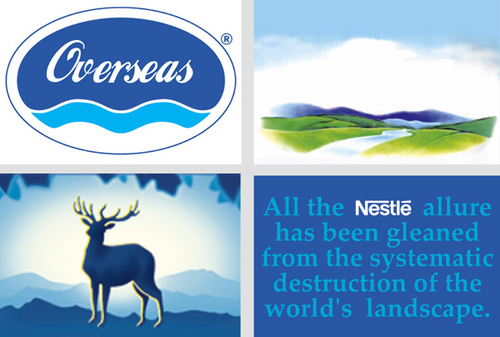TEU: 8 feet x 20 feet
dal 24/2/2006 al 6/5/2006
Segnalato da
Dario Azzellini
Oliver Ressler
Donna Conlon
Minerva Cuevas
San Keller
Christian Mayer
Yves Mettler
Marion Ronca
Jesper Nordahl
Philippe Rekacewicz
Sofie Thorsen
Dan Wilkinson
Katharina Schlieben
Sonke Gau
24/2/2006
TEU: 8 feet x 20 feet
Verein Shedhalle, Zurich
Part two of the project series "Colonialism without colonies? - Relation between tourism, neo-colonialismand migration"

Part Two of the Thematic Project Series
COLONIALISM WITHOUT COLONIES?
RELATIONS BETWEEN TOURISM, NEO-COLONIALISM AND MIGRATION
Projects by: Dario Azzellini and Oliver Ressler, Donna Conlon, Minerva Cuevas, San Keller, Christian Mayer / Yves Mettler / Marion Ronca, Jesper Nordahl, Philippe Rekacewicz, Sofie Thorsen, Dan Wilkinson
Interviews: Reto Aschwanden in conversation with Hans Fassler ("Reise in schwarz-weiss: Schweizer Ortstermine in Sachen Sklaverei", Zurich: Rotpunktverlag, 2005), Reto Aschwanden in conversation with Pia Hollenstein (National Councillor /Green Party St. Gallen), Jochen Becker in conversation with Guy Thomas (Archivist of Basler Mission / mission 21) and Beat von Wartburg (Manager of the Christoph Merian publishing house / Christoph Merian Foundation), Ina Boesch in conversation with Gesine Kruger (Historian / University Zurich): "Schwarze Geschafte und die Schweiz", DRS 2, broadcast "Reflexe", Bianca Miglioretto in conversation with Noel Alemania (vice-president of the Filipro-Employees UFE-KMU, union of the protesting Nestle'-workers at the Philippines), Bianca Miglioretto in conversation with Carina Castillo (National Coalition for the Protection of Workers Rights, Southern Tagalog, Philippines)
In Dialogue with
Jochen Becker/metroZones
Bourdieu in Algeria, Bourdieu in the Banlieue. A Commentary on "Pierre Bourdieu: In Algeria." From/To Europe, part 2.
Pierre Bourdieu: In Algeria. Testimonies of Uprooting. An exhibition by Camera Austria, Graz / Christine Frisinghelli and the Fondation Pierre Bourdieu, Gene've / Franz Schultheis.
Symposium
April 22/23, 2006
Bourdieu in Algeria, Bourdieu in the Banlieue.
Film program with Remember Resistance
We are pleased to invite you to our second exhibition, for example, TEU: 8 feet x 20 feet, of the thematic project serie Colonialism without Colonies? Relationships between Tourism, Neocolonialism, and Migration. This exhibition is concerned with neocolonial economic structures and continuities of colonial relationships.
ISO-Containers have a width of eight feet (2.44 meters) and a length of 20 feet (6.06 meters). From that the abbreviation TEU (Twenty-feet Equivalent Unit) is derived. This standardization has been chosen so that containers can be transported by trucks, railroad or ship. The trade in raw materials played an eminently important role in colonial politics and economics. The present post-colonial and neo-colonial society is based on a balance of power and knowledge and requires a number of colonial practices. Hence today it is no longer just raw materials that continue to influence political and economic decisions but also the unequal conditions of mobility and communication that support neo-colonial dependencies.
Current neo-colonial situations are characterized by a gradient of power in which direct political dependency is replaced by a perpetuation of economic dependency. Multinational corporations and the governments of countries that support them strive to control markets in resources, finances, and goods in poorer countries. In a continuation of colonialism, these countries are used as a reservoir of cheap labor and raw materials, often without making any contribution to a diversified economic and social structure. Countries like Switzerland, which never had colonies, are still tied into these (neo)colonial relationships of power and exchange. Currently they take form in the worldwide privatization of drinking water or the role of the Swiss chemical industry in the trade of pharmaceutical and agrochemical products. Even projects for developmental aid turn out to be conflict-ridden and paradoxical ventures that produce relationships of economic dependence in a globalized world economy although they seek to decolonize.
The project is structured in three modules: research and projects by contemporary artists; the second part of From/To Europe, showing the rediscovered photographs Pierre Bourdieu: In Algeria. Testimonies of Uprooting and inviting to discuss them, further audio stations with conversations on Switzerland's position to its own (neo-)colonial involvements.
Bourdieu in Algeria, Bourdieu in the Banlieue is the second part of the project series From/To Europe, developed by Jochen Becker/metroZones. This time the focus is on a photographic exhibition organized by Camera Austria and the Fondation Pierre Bourdieu: Pierre Bourdieu: In Algeria. Testimonies of Uprooting, supplemented by comments on (post)colonial conditions. The French sociologist Bourdieu was stationed in Algeria as a young colonial soldier. His (research) photographs trace the colonial power's policy of expulsion: villages and local agriculture were destroyed and those unemployed as a result were driven into Algerian cities. The leap over the Mediterranean into France's factory provided work for many North African immigrants. Many of them were housed in shanties at the edge of French cities. In this respect, the large housing developments (banlieues) that were constructed were a blessing for the immigrants.
Today almost 19 million people live in such developments. Now the state wants to "clean them out with high-pressure water blasters". The emergency legislation (e'tat d'urgence) dating from the Algerian war is no longer employed in the former colonies but in zones around the metropolises of immigrants in France. A debate between Bourdieu and descendents of North African immigrants in a banlieue makes the (old) conflict clear.
Image: Minerva Cuervas, Overseas (2006), Banner Collage
Opening: February 24, 2006, 19:00
Verein Shedhalle
Rote Fabrik Seestrasse 395 Postfach 771 CH-8038 Zurich
Opening times
Wed/Fri: 14:00 - 17:00, Thu 14:00 - 21:00, Sat/Sun: 14:00 - 20:00



